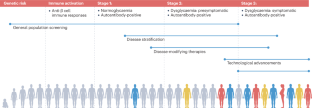One hundred years after the Nobel prize was bestowed on Banting and McLeod for the ‘discovery’ of insulin, we are again seeing major evolutions in the management of type 1 diabetes mellitus, with the prospect of achieving disease control beyond mere management now becoming real. Here, we discuss the latest, most notable developments.
Key advances
-
Automated insulin delivery improves glycaemic control and pregnancy outcomes in pregnancy complicated by maternal type 1 diabetes mellitus (T1DM) compared to standard of care2.
-
Once-weekly basal insulin is non-inferior compared to its once-daily counterpart, in terms of HbA1c (ref. 5).
-
Whole-blood gene expression signatures can help in stratifying the heterogeneity of T1DM6.
-
In patients with T1DM, detection of disease earlier in its course rather than later yields a more favourable clinical outcome at symptom onset8.
-
Teplizumab not only preserves β-cell function at stage 2 T1DM7, but also at stage 3 (symptom-onset) T1DM10.
This is a preview of subscription content, access via your institution
Access options
Access Nature and 54 other Nature Portfolio journals
Get Nature+, our best-value online-access subscription
$29.99 / 30 days
cancel any time
Subscribe to this journal
Receive 12 print issues and online access
$209.00 per year
only $17.42 per issue
Buy this article
- Purchase on Springer Link
- Instant access to full article PDF
Prices may be subject to local taxes which are calculated during checkout

References
Phillip, M. et al. Consensus recommendations for the use of automated insulin delivery technologies in clinical practice. Endocr. Rev. 44, 254–280 (2023).
Lee, T. T. M. et al. Automated insulin delivery in women with pregnancy complicated by type 1 diabetes. N. Engl. J. Med. 389, 1566–1578 (2023).
Ekberg, N. R., Hartvig, N. V., Kaas, A., Møller, J. B. & Adolfsson, P. Smart pen exposes missed basal insulin injections and reveals the impact on glycemic control in adults with type 1 diabetes. J. Diabetes Sci. Technol. https://doi.org/10.1177/19322968221104142 (2022).
Kazda, C. M. et al. Novel once-weekly basal insulin Fc achieved similar glycemic control with a safety profile comparable to insulin degludec in patients with type 1 diabetes. Diabetes Care 46, 1052–1059 (2023).
Russell-Jones, D. et al. Once-weekly insulin icodec versus once-daily insulin degludec as part of a basal-bolus regimen in individuals with type 1 diabetes (ONWARDS 6): a phase 3a, randomised, open-label, treat-to-target trial. Lancet 402, 1636–1647 (2023).
Suomi, T. et al. Gene expression signature predicts rate of type 1 diabetes progression. EBioMedicine 92, 104625 (2023).
Herold, K. C. et al. An anti-CD3 antibody, teplizumab, in relatives at risk for type 1 diabetes. N. Engl. J. Med. 381, 603–613 (2019).
Hummel, S. et al. Children diagnosed with presymptomatic type 1 diabetes through public health screening have milder diabetes at clinical manifestation. Diabetologia 66, 1633–1642 (2023).
Sims, E. K. et al. Screening for type 1 diabetes in the general population: a status report and perspective. Diabetes 71, 610–623 (2022).
Ramos, E. L. et al. Teplizumab and β-cell function in newly diagnosed type 1 diabetes. N. Engl. J. Med. https://doi.org/10.1056/NEJMoa2308743 (2023).
Author information
Authors and Affiliations
Corresponding author
Ethics declarations
Competing interests
C.M. serves or has served on the advisory panel for Novo Nordisk, Sanofi, Merck Sharp and Dohme Ltd, Eli Lilly and Company, Novartis, AstraZeneca, Boehringer Ingelheim, Roche, Medtronic, ActoBio Therapeutics, Pfizer, Imcyse, Insulet, Zealand Pharma, Avotres, Mannkind, Sandoz and Vertex. Financial compensation for these activities has been received by KU Leuven; KU Leuven has received research support for C.M. from Medtronic, Imcyse, Novo Nordisk, Sanofi and ActoBio Therapeutics; C.M. serves or has served on the speakers bureau for Novo Nordisk, Sanofi, Eli Lilly and Company, Boehringer Ingelheim, Astra Zeneca and Novartis. Financial compensation for these activities has been received by KU Leuven. C.M. is president of EASD. All external support of EASD is to be found on http://www.easd.org/. P.M. has no competing interests.
Additional information
Related links
INNODIA: www.innodia.eu
Rights and permissions
About this article
Cite this article
Martens, PJ., Mathieu, C. Type 1 diabetes mellitus: a brave new world. Nat Rev Endocrinol 20, 71–72 (2024). https://doi.org/10.1038/s41574-023-00936-y
Published:
Issue Date:
DOI: https://doi.org/10.1038/s41574-023-00936-y
